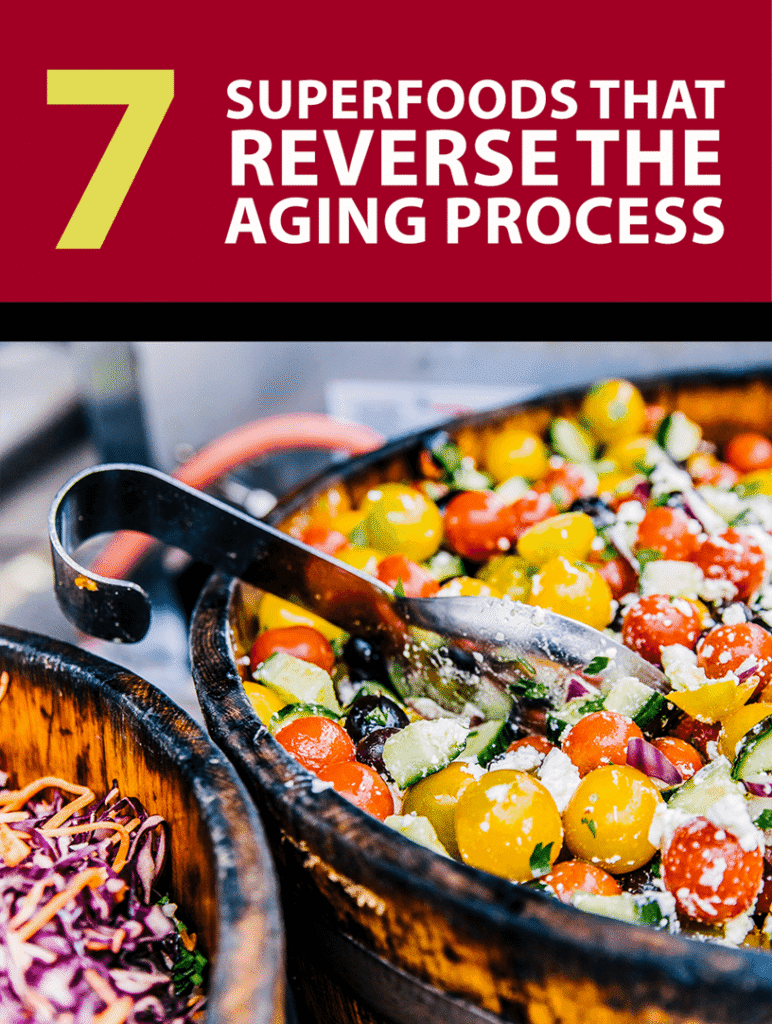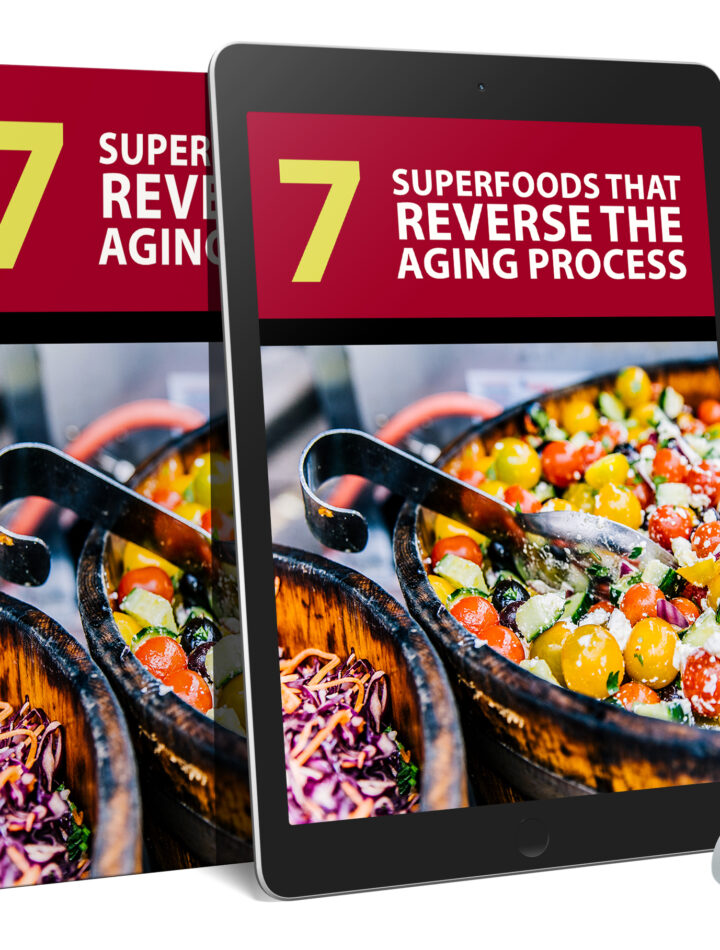Introduction to Aging and Its Effects
Why We Age and What Happens to the Body
7 Superfoods That Reverse The Aging Process. Aging is one of those unavoidable facts of life. We all go through it, and while we can’t pause time, we can try to make the Life journey a little easier. As we age, our bodies experience some changes—some are visible, like wrinkles and drooping skin. In contrast, others are more internal, like weakened muscle strength, weakened metabolism, and a weakening in thinking, learning, and remembering abilities. But why does this all happen?

The human aging process begins at the cellular level. Over time, cells became damage due to environmental stress, poor diet, and internal factors like oxidative stress and inflammation. This cellular damage leads to a breakdown in tissue function and ultimately manifests in the common signs of aging we see on the outside—dry skin, fine lines, age spots, and more. Internally, aging can affect the efficiency of organs, decreasing immunity, and lower energy levels.
Biologically, aging is linked with a shortening of telomeres (the protective caps at the end of DNA strands), decreased production of collagen and elastin (the skin’s support structure), and increased inflammation. All of this factors to not only how we look but also how we feel.
But here’s the good news: while we can’t completely eliminate aging, we can slow down the process significantly. And one of the most effective and natural ways to do that is through the foods we eat.
The Connection Between Skin Health and Aging
Your skin is your body’s largest organ, and it’s often the first area where signs of aging are noticed. Dry skin, sagging skin, dull skin tone, fine lines—these things are often visible because of the body’s decreased ability to produce natural oils and maintain hydration. In addition, there are external factors such as sun exposure, pollution, and stress!
Before age, skin elasticity diminishes; collagen production slows down and the skin just doesn’t bounce back the same way it should. This is why it is really important to know about skin health and to support skin health in the aging process. And the foods you eat can help support skin health as well! Some nutrients help regenerate cells, hydrate the body, and produce collagen to keep your skin looking youthful!
Nourishing your skin from the inside starts with a diet abundant in antioxidants, vitamins, minerals and essential fatty acids. This is what superfoods are all about, and we will get into those soon!.
Understanding the Aging Process
Biological Definition and Timeline
Aging is reduction in physiological functions important for survival and reproduction. Or simply put, your body is slowing down in a variety of ways, gradually. Generally speaking, this subtle process starts sometime in your 30s or 40s and first becomes noticeable in your 50s.
Aging is a collection of changes, not the same as chronic illness. Aging is more like a slow burn rather than a fire. For example, you may exhibit a loss of bone density or a loss of muscle strength or your memory might get foggier. On the inside, your immune response is likely wearing down and you are slowly accumulating chronic disease like heart disease or diabetes or even cancer.
The central issue of aging, is DNA damage. When cells reproduce, they can replicate the DNA with a small error rate. Over decades, those errors might become detrimental; also, stressors in the environment such as UV light and pollution aggregate this damage. This is why many anti-aging strategies contemplate cellular repair and limiting environmental stressors such as inflammation and oxidative damage.
Physical and Cognitive Signs of Aging
Let’s get specific—what exactly happens as we age?
The skin becomes thinner, drier, and loses elasticity.
The hair may gray or thin.
Vision may decline, particularly the ability to focus on things that are near (this is called presbyopia).
Memory and cognitive function can decline, particularly short-term memory.
The muscle mass decreases, and fat mass may increase.
Bone quality declines and becomes more brittle.
Sleep (the soundness of sleep) changes; many older adults have difficulty staying asleep.
Hearing may decline.
Metabolism slows, making you more prone to weight gain.
All of that sounds a bit pessimistic—but of course, only if we do nothing about it! Surprisingly, superfoods can play a key role in allaying many of the aforementioned effects.
Reversing Aging Naturally
The Science Behind Anti-Aging Efforts
Modern science has made amazing advances in understanding aging and while we are a long way from finding the fountain of youth, we do know that aging is mostly driven by lifestyle choices (diet, exercise, sleep schedule, and stress management).
Scientists now believe that chronic inflammation and oxidative stress are leading contributors to aging. More specifically, these two foes are causing damage to your DNA, tire out your cells, and cause a much quicker amount of wear and tear inside your body. Luckily, superfoods are loaded with helpful anti-oxidants and anti-inflammatory properties that help offset this damage.
Recent research has also shown that some nutrients can influence gene expression responsible for aging, support telomere health, and enhance mitochondrial processes. Put simply, certain foods can influence aging at a molecular level.
Lifestyle Choices That Influence Aging
If you want to look and feel younger, your habits matter. Here’s a quick list of aging accelerators:
- Smoking
- Excessive alcohol
- Poor diet (processed foods, refined sugars)
- Chronic stress
- Sedentary lifestyle
- Poor sleep
Now, compare those with anti-aging habits:
- A nutrient-dense, balanced diet
- Regular physical activity
- Quality sleep
- Meditation or stress-relieving practices
- Hydration
- Skin protection from UV rays
The contrast is clear. Small changes make a big difference over time.

Importance of a Balanced Diet
Food can be the strongest medicine or slowest poison when it comes to anti-aging. Lean proteins, healthy fats, whole grains, and lots of strawberries and blueberries can do miracles for your body when consumed together.
Balanced/customized diets do a lot more than help you normalize your weight. They feed your skin, nourish your brain, help with digestion, regulate your blood sugar levels, and protect your heart. Superfoods amplify this effect thanks to the concentration of nutrition in those foods.
Using superfoods when eating is not about counting calories but adding to the quality of your calories. A handful of blueberries or a filet of salmon can provide a greater anti-aging benefit than a supplement can ever offer.
What Are Superfoods?
Definition and Nutritional Value
“Superfoods” is more marketing jargon than science, but that doesn’t invalidate it. Superfoods are natural foods that are nutrient-rich and provide incredible benefits to health and wellness. They are often full of antioxidants, vitamins and minerals, fiber, and healthy fats.
Typical examples include leafy greens, berries, fatty fish, nuts, seeds, and legumes. Superfoods provide fuel for your body as well as protection against damage, inflammation, detoxification support, and chronic disease protection.
Superfoods are like nature’s multivitamins. They provide nutrients in complex, bioavailable forms that the body absorbs and utilizes. The body can absorb these nutrients together with fiber, enzymes, or other cofactors, and therefore there is less possibility of toxic dosage than with synthetic supplements.
Role of Superfoods in Anti-Aging
Anti-aging isn’t just about looking younger—it’s about feeling younger. And that’s where superfoods shine. These nutrient-packed foods work on multiple fronts:
- Combat oxidative stress with antioxidants
- Reduce inflammation with omega-3s and polyphenols
- Strengthen skin with vitamins A, C, and E
- Support cognitive health with flavonoids and healthy fats
- Protect DNA with nutrients like astaxanthin and zeaxanthin
From your brain to your bones, superfoods offer full-body rejuvenation.
Top 7 Superfoods That Reverse Aging

Leafy Green Vegetables
Nutrient Profile and Benefits
Leafy greens like spinach, kale, arugula, collard greens, mustard greens, and Swiss chard are absolute anti-aging champions. Packed with vitamins A, C, E, and K, these veggies deliver a powerful punch of antioxidants, which help reduce oxidative stress—the root of most aging signs.
Spinach, for example, is a powerhouse of beta-carotene and vitamin C, both of which support collagen production and help repair skin damage. Kale is loaded with lutein and zeaxanthin, two antioxidants that protect your eyes from age-related diseases. And don’t forget folate—a B-vitamin essential for DNA repair, found abundantly in these greens.
But that’s not all. Leafy greens are also rich in fiber, which helps digestion, balances blood sugar, and supports weight management. They even have calcium and magnesium, crucial for strong bones—something we definitely need as we age.
Tips for Consumption
The most attractive quality of leafy greens is the versatility:
Add spinach or kale to your smoothies
Sauté collards with garlic and olive oil
Add arugula to salads and other dishes for a peppery taste
Add Swiss chard to soups and stews
Use romaine or butter lettuce as a wrap
A reasonable goal would be to have at least one serving of greens in two meals a day. If fresh isn’t available, frozen is just as good and has similar nutrients.nt content. Just avoid boiling too much—it leaches out water-soluble vitamins.
Beans and Lentils
Fiber-Rich Powerhouses
Beans and lentils are some of the most overlooked superfoods, especially when it comes to aging gracefully. And beans and lentils are loaded with fiber, protein, folate, and iron; pretty much any system in your body could use a little bean love! While they have many wonderful benefits and are known to support healthy weight management, they have also been shown to regulate blood sugar and help prevent many forms of heart disease.
Fiber is the star nutrient here! Fiber, in addition to helping lower total blood cholesterol by lowering LDL or bad cholesterol, fiber promotes whole body and digestive health, and may help stabilize blood glucose levels. Additionally, diets that include fiber are associated with a reduction in chronic inflammation that is related to aging.
Eating beans multiple times a week lowers your risk for chronic diseases, which include heart disease, type 2 diabetes, and some cancers. They also have a relatively low glycemic index that can prevent or ameliorate insulin resistance, resulting in a boost to your metabolism.
Enzyme Boosters for Better Digestion
One more major advantage of beans and lentils is the impact they have on digestion. Beans and lentils help stimulate the gut’s enzyme production, allowing your body to use more nutrients from other foods. That means better skin, stronger nails, and more energy – all essentials to slow the aging clock.
Consider the following suggestions to incorporate more beans and lentils into your meals:
Black beans make a great addition to tacos or burritos
Lentils are great for soup or stew
Add chickpeas to your salads, or roast them as snacks
Use hummus to dip or spread
Add white beans to pasta
If your digestion is slow going, start slow. The system isn’t used to them, and drink plenty of water to help your body adjust.
Blueberries
Memory and Brain Health Enhancer
Blueberries are often called “brain berries” – and rightly so. High in flavonoids and anthocyanins, these little fruits have substantial effects on brain health. They protect neurons, lower inflammation in the brain, and improve brain cell communication while transmitting neuroprotective factors.
Blueberries have been demonstrated to slow cognitive decline and improve memory in studies. One study showed that daily consumption of blueberry juice for 12 weeks improved memory in older adults and showed a reduction in depressive symptoms.
The antioxidants in blueberries, particularly anthocyanins, cross the blood-brain barrier and have direct actions in the areas of the brain that affect learning and memory.
Antioxidant Superstars
In addition to promoting brain health, blueberries are also rich in vitamin C, vitamin K, and manganese. They are very powerful against oxidative damage to cells, which is one of the main contributors to aging. Regular consumption helps protect the skin from UV-related damage, minimizes wrinkles, and helps fight discoloration in our skin.
Another great thing about blueberries is that they are low in calories and loaded with nutrients. A single cup has only about 85 calories, but that same cup is loaded with antioxidants and fiber.
Here’s how to enjoy them:
Add fresh blueberries to yogurt, oatmeal, or cereal.
Throw them into a smoothie with spinach and almond milk.
Bake them into muffins or pancakes.
Eat them frozen for a healthy dessert.
Fresh, frozen, or dried, blueberries are one of the easiest and tastiest superfoods to consume on a daily basis.
Citrus Fruits
Vitamin C and Collagen Production
Citrus fruits—such as oranges, lemons, limes, grapefruits, and tangerines—are a boon to your skin. They’re chock full of vitamin C, a vital nutrient for collagen synthesis. Collagen is a protein responsible for keeping your skin firm and elastic. Naturally, our collagen levels decline as we age, resulting in wrinkles and sagging skin. However, a consistent source of vitamin C can slow that progress tremendously.
Vitamin C is also an antioxidant that protects against free radicals, which harm skin cells and increase the signs of aging. Furthermore, enough vitamin C will boost your immune system, lowering your odds of becoming ill or inflamed.
Hydration and Detox Support
Citrus fruits are loaded with water content (up to 87%), which helps keep the body hydrated – a vital component for youthful, glowing skin. They also contain soluble fiber (particularly pectin) which helps protect gut health and detoxify the body.
Consuming lemon water on an empty stomach may help you better digest your food as well as cleanse your body. Grapefruit has also been believed to aid in weight loss and improve heart health. Oranges are great pre-workout snack thanks to their natural sugars and hydration.
Try introducing citrus fruits into your routine with these combinations:
Warm lemon water first thing in the morning
Fresh orange slices as a snack
Grapefruit in salad
Lime in dressings or marinades
Just be aware of your servings if you’re a little sensitive to acidity or have acid reflux.
Salmon
Omega-3s and Skin Elasticity
If you want to have glowing, wrinkle-free skin, you need to make sure that salmon is a staple in your diet. This fatty fish is high in omega-3 fatty acids, especially EPA and DHA, which are known to fight inflammation, improve hydration, and keep your skin elastic.
Omega-3’s also help with regulating oil production on the skin surface while improving your heart health by lowering your triglycerides and improving blood vessel function. To top it off, they help with mental clarity and reduce the likelihood of experiencing depression.
Anti-Inflammatory Astaxanthin
Salmon isn’t just about omega-3’s—that pink fish is also a tremendous source of a potent antioxidant called astaxanthin, which gives salmon its pink color. Astaxanthin has been researched and recognized to improve skin tone and texture, diminish age spots, and protect against damage from the sun. It may also help to prevent DNA damage, which is important when it comes to aging.
Ways to incorporate salmon into your meals:
Grilled or baked salmon fillets flavored with lemon and herbs
Salmon salad made with Greek yogurt and mustard
Smoked salmon on bagels or in wraps
Flakes of cooked salmon stirred into pasta or rice bowls
Aim for two servings of fatty fish such as salmon, a week. Eat salmon each week to get the full anti-aging benefits.
Dark Chocolate
Heart Health and Brain Function
Yes, that’s right―chocolate can actually be beneficial for your health, as long as it is the dark chocolate variety, which is full of great benefits. Dark chocolate has plenty of antioxidants, such as flavonoids, polyphenols, and catechins. Antioxidants assist with improved blood flow, lower systemic inflammation, and cell protection against oxidative stress.
One key benefit of dark chocolate is to support heart health. Dark Chocolate naturally lowers blood pressure, due to the production of nitric oxide to relax your blood vessels, and enhance circulation. Dark Chocolate lowers oxidized LDL (bad cholesterol), while raising HDL (good cholesterol) to slow the aging process and improvement of heart health.
Cognition and brain health would benefit from dark chocolate too. Research shows that the flavonoids found in dark chocolate can improve cognitive function, memory, and mental alertness. Enjoy a piece of dark chocolate a couple of times a week while aged might help delay neurodegenerative diseases, specifically Alzheimer’s.
How Much to Eat and How Often
Before you plunge into a chocolate bar, remember that moderation matters. Chocolate with a cocoa percentage of at least 70% that contains the least added sugar is the best option for health benefits. A small square (about 1 ounce) a few times a week should be sufficient. Here are some delicious and clever ways to include dark chocolate into your diet:
Melt dark chocolate over fruit slices
Add dark chocolate chips to oatmeal or yogurt
Shave dark chocolate into smoothies or put on top of desserts
Mix dark chocolate into trail mix (small amounts)
Dark chocolate proves that indulgence and health can co-exist!h can coexist when done right.
Eggs
Complete Protein Source
Eggs are often considered almost a complete food. They are a condensed source of high-quality protein, which contains all nine essential amino acids your body needs to repair tissues and to maintain muscle. This is important for maintaining lean mass (muscle) as we get older.
The protein in eggs helps us build and replace collagen in the skin that gives it structural integrity and elasticity. Eggs contain a fat called lecithin that helps maintain fluid cell membranes for flexible, elastic cells that will better absorb nutrients and maintain hydration to give skin a youthful appearance.
And eggs are not only a good source of protein. They are the edible substance richest in choline, a B vitamin associated with liver function, brain development, and nerve health. Low levels of choline have been associated with memory decline and cognitive disorders.
Brain and Eye Health Benefits
Eggs are one of the more significant dietary sources of lutein and zeaxanthin, the carotenoids that are concentrated in the retina of the eye, which may help filter damaging blue light and protect against age-related macular degeneration (AMD), a notable cause of vision loss in older adults.
Eggs also contain large amounts of vitamin B12, selenium, and riboflavin, which may be more beneficial when consumed together. These nutrients help with energy production in the body and also support brain function and immune response. Although eggs have been historically demonized for causing health risks, relevant studies demonstrate that eggs do not harm the heart health of most people. Research suggests that eggs may increase HDL cholesterol levels and positively alter one’s cholesterol levels.
Tips to enjoy eggs in your daily meals:
Boiled and diced an avocado toast
Mixed into an omelet with leafy greens and tomatoes
Poached and placed on whole-grain bowls
Scrambled with spinach and mushrooms
Eating 1-2 eggs per day can fit into a healthy anti-aging diet.
How These Superfoods Fight Against Aging
Dealing with Oxidative Stress
Oxidative stress occurs when there is an imbalance of free radicals and antioxidants in the body. It is one of the most common causes of cellular aging and disease development. Free radicals are oxygen species that attack your DNA, protein, and cell membranes, causing damage that builds up over time.
Superfoods are rich in antioxidants that neutralize free radicals to prevent damage. Think of antioxidants as little bodyguards that maintain the healthiness of your cells and allow them to perform optimally.
Vitamin C, E, polyphenols, flavonoids, and carotenoids found in superfoods like berries, greens, citrus, and dark chocolate help to dramatically eliminate this stress. The result? Less wrinkles, more energy, better focus, and a reduced chance of disease.
Preventing Cellular Degeneration
Aging leaves us with many visible signs, like sagging skin, joints, and bodily pain, and fatigue, that are caused by cellular degeneration. As we age, our cells copy less efficiently, and internal structures, like the mitochondria, become compromised.
Anti-aging superfoods can replenish nutrients necessary to combat cellular degeneration, provide a stimulating environment for cellular repair, and support healthy cellular replication. For example, astaxanthin found in salmon protects the cell’s DNA and the functions of the mitochondria. Similarly, proteins found in eggs and beans support regenerative muscle and tissue repair.
Adding these superfoods to your plate regularly enables you to give your body the capacity to self-renew from the inside out.
Enhancing Cognitive Functions
It is not only about looking young, it is about feeling young, too. As our brain ages, neurons may become inflamed, or they may degenerate. If we think about all the cognition that is negotiated through neurons, the potential to impair memory, learning, and decision-making is a serious concern.
Foods like blueberries, salmon, eggs, and dark chocolate are super foods, combining all kinds of nutrients for the brain: Omega-3s, choline, polyphenols, flavonoids, and others are being studied for their capacity to better bolster neuroplasticity (the ability of the brain to make new connections), assist with memory retention, and protect against neurodegenerative disease.
Consuming these brain-healthy nutrients regularly can have a positive impact on supporting the brain well into later life. You can function at a higher level, be connected, alert, and actively cognitively!
Best Ways to Include Superfoods in Daily Diet
Creative Recipes and Preparation Ideas
Incorporating superfoods into your daily diet does not have to be boring or difficult. Below are some exciting options for you to get started:
Smoothies: To kick your day off right, toss some spinach, blueberries, citrus juice, and Greek yogurt together to make a superfood smoothie.
Power Bowls: For lunch, take quinoa, beans, lentils, avocado, salmon, and leafy greens, and put them together to create a wonderful power bowl.
Egg Muffins: Take muffin tins and mix your eggs with kale, mushrooms, and peppers, bake, and you have grab-and-go superfood breakfast muffins.
Snacks: Prepare healthy snacks! Roast some chickpeas, or hard-boil some eggs and dark chocolate, and keep them in sight to enjoy as snacks on the run.
When you can prepare a few foods in advance, it can help ensure you’re consistently fueling your body with age-fighting nutrients.
Tips for Consistent Consumption
Staying consistent is the most important aspect of slimming down. Here are some good habits to incorporate into your daily routine to sustain a superfood diet for the future.
Make sure to have a weekly shop based on the superfoods you want to incorporate.
Batch cook some beans, lentils, and grains so you can have something ready to go.
Use a food tracker app to watch your nutrient intake closely.
Try superfood combinations to help you avoid getting fatigued from the flavors yet.
You are only so far away from a superfood meal when you make consistent, daily choices.hanges can lead to big anti-aging benefits over time.
Conclusion
Aging is a natural process, but the rate and degree to which it affects you is entirely up to you, and what you eat. Superfoods can do much more than just enhance your health; they can help improve the quality of your daily life.
Superfoods promote cell repair, help combat oxidative stress, and reduce inflammation from the inside out, all of which help slow the aging process. Whether it be through dark chocolate, berries, fish, or leafy greens, nature has already given us a gift to help us be healthy, vital, and full of life and vigor as we age.
So stop waiting and start eating smarter today. Your future self will thank you.
FAQs
Can eating these superfoods completely stop aging?
Aging is an inevitable process that we all experience. Aging cannot be halted. However, we do have superfoods that can drastically diminish the aging process and the effects of aging both internally and externally, in visible and invisible ways.
How long before I see results from eating superfoods?
Everyone is different, however, as long as you eat superfoods consistently and in conjunction with a healthy balance of lifestyle choices, you will most likely experience ways in which you feel more energetic, note alterations in your skin, and experience enhanced focus after several weeks.
Can I replace all my meals with these superfoods?
Not really. Superfoods and superfoods eating plans can supplement a balanced diet, but should never be the sole source of nutrients. It’s about amalgamation rather than using superfoods as replacements.
Are there any side effects of consuming too many superfoods?
If you are eating superfoods at every meal, you could be skewing balances and the essential nutrients you need from those meals, so just remember everything in moderation is important when it comes to even healthy foods.
What are the best combinations of these superfoods?
You can try: Blueberries, with Greek yogurt and nuts, and Salmon, with leaf salad and a citrus dressing, and Eggs; with spinach, and whole grain toast. In combination, both types of superfoods will provide you with a broader nutritional profile and allow you to maximize the health benefits associated with anti-aging.





